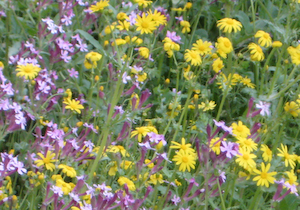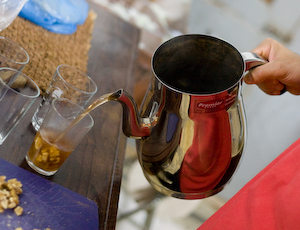by Joe Hackman
“Would you mind straightening your grandmother’s painting before you sit down?” my grandfather asked. “Not at all,” I replied, “so long as you give me a guided tour.” Every morning my grandfather begins his day by staring at my grandmother’s painting of her childhood home in Perkasie, vividly remembering stories, furniture and food that was part of the “Yoder House.”
After he had finished describing what he remembered about my grandmother’s home, I asked if we could “walk” through my grandparents’ former residence in Allentown.
I often think of this house in Allentown—grilling with my grandfather in the backyard, eating Christmas and Easter dinners around the picnic table in the basement, and walking to J. Birney Crum Stadium to watch high school football games. Many of my favorite childhood memories took place in and around that house.
As my grandfather and I “walked” through the living room, the kitchen, the bedrooms, his office, and the basement, I became aware, not only of special memories that were made in those rooms, but of how that house was significant to my spiritual formation.
My grandparents moved to Allentown in 1946 to help with the Allentown Mission, and although Souderton and Allentown were not separated far by geography, Allentown was a world away from where they were raised. By choosing to live in a community where neighbors didn’t speak Pennsylvania Dutch or understand the significance of head coverings, my grandparents were forced to become self-reflective. “What does it mean to maintain a Mennonite identity in a neighborhood that doesn’t have other Mennonites?” and “How do we effectively communicate who we are?” were questions that challenged their spiritual formation in ways they did not experience in Souderton. Life in the city ensured the continual presence of these questions in their lives, and the ways they attempted to answer these questions made spiritual formation a dynamic, on-going process for their children and grandchildren.
One place I observed my grandparents communicate their faith was on their front porch. Many summer evenings my parents, along with my grandparents, aunts and uncles would sit and talk on the porch while my cousins and I would play “run-down” in the front yard. When folks from the neighborhood would pass by on walks with their dogs or families, one thing was certain: they didn’t pass by without receiving a greeting from my grandfather. Sometimes conversations took place at a distance with simple greetings and pleasantries exchanged, while other times neighbors joined us on the porch for conversation and Diet Coke or iced tea.
The front porch was used as safe place for my grandparents and their neighbors to exchange snapshots of their lives. But more than a place to practice cordiality, the front porch was a place to practice the spiritual discipline of hospitality. Neighbors knew they was always a seat for them on the porch—it was a place where they would feel welcome, and a place where they could be heard. In the same way that my grandparents’ intentional choice to live in Allentown provided important questions that impacted my spiritual formation, their demonstration of hospitality on the front porch was also significant to my faith development. It was here where I witnessed clear examples of how to practice hospitality and how to do outreach.
When the weather changed and the porch furniture was brought in for the season, spiritual formation took place inside. Many winter evenings my siblings and I were picked up at school by my grandparents and spent a few hours doing our homework at their home while my parents were at work.
Homework always seemed easier, or at least more fun, at my grandparents’ house. My brother usually worked from a small table in the kitchen, while my sister and I studied from the dining room table where many helpful resources were at our disposal. For example, my grandmother allowed us to use her prized electronic spell-checker that she used to write her weekly newspaper column. Whenever we came across an unfamiliar country in Social Studies homework, or an unusual organ in Biology homework, we followed the example of my grandmother and researched it extensively in the Encyclopedia Britanica. And finally, if my grandfather was home during our homework sessions, he would play the role of archivist, and search in his office through magazines, books, or personal records that might help with our line of inquiry.
The way my grandparents valued questions I posed in their house was spiritually formational. The way in which they helped me search for fifth grade homework questions displayed a quiet confidence that big questions should be raised. As I grew older and my big questions were not easily found in encyclopedias, I never doubted the inherent value in raising big questions. My grandparents taught me that raising big questions doesn’t lead us away from faith, but draws us closer to God’s reality.
I doubt my grandparents are aware of how their Allentown home shaped me, and I’ve never heard either of them use the term “spiritual formation.” Although they moved away from Allentown almost five years ago, I’m grateful for times like last Saturday, when we get to “walk” through their home again. Their house in Allentown will forever be part of my spirituality. Because of its location, the front porch, and evenings spent doing homework, I will always be challenged to ask how I am making use of my current living space for the spiritual formation of my family and community.

 American philosopher Calvin O. Schrag in his book
American philosopher Calvin O. Schrag in his book  Last summer I was part of the !Explore program with
Last summer I was part of the !Explore program with  David Landis, dplandis@mosaicmennonites.org
David Landis, dplandis@mosaicmennonites.org Last week my Israeli friend Maoz and I took a journalist and photographer from the
Last week my Israeli friend Maoz and I took a journalist and photographer from the The longer I stay in
The longer I stay in  For many of us, the word fasting conjures up images of going without food, depriving ourselves of needed nourishment so that we can spend more time in prayer. It is not always a positive image, the idea of giving up something that is so important to life and we wonder what difference it makes when we pray? Jesus assumed his disciples would fast. In Matthew 6:16-18, he uses the word, “when”, before he gives his followers instructions about fasting.
For many of us, the word fasting conjures up images of going without food, depriving ourselves of needed nourishment so that we can spend more time in prayer. It is not always a positive image, the idea of giving up something that is so important to life and we wonder what difference it makes when we pray? Jesus assumed his disciples would fast. In Matthew 6:16-18, he uses the word, “when”, before he gives his followers instructions about fasting.